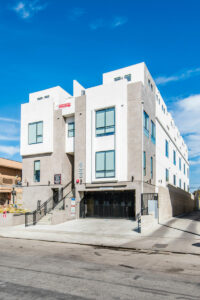Hollywood-based Schon Tepler Partners is a developer and builder that creates boutique mixed-use multifamily ranging from 10 to 50 units. The firm has developed 30 buildings and has nine projects currently under development in neighborhoods including Echo Park, Koreatown, Mid-City, Studio City and Hollywood.
“We’re experts at building small boutique buildings in L.A.,” said Artem Tepler, a principal at the firm.
“We partner with high net-worth individuals,” principal Paul Schon added. “They invest into us as an LLC. They’re the capital partners and we’re the development partners.”
Schon was a broker at Marcus & Millichap when he met Tepler.
“A mutual friend introduced us,” Schon said. “While I was still brokering, we started flipping homes together. We worked well together.”
Tepler said the two started off buying homes “at the height of the recession” in Compton, purchasing about 50 altogether.
The pair flipped homes from 2009 until 2012, which became a pivotal year in their partnership.
“We built our first apartment building” in 2012, Schon said.

Their inaugural development was a Westchester multifamily complex.
“We became pretty successful sticking to the smaller boutique buildings throughout the city,” Schon said. “We have a couple cold callers (looking for properties). We buy the homes, knock down the homes and build a 13-unit (building). If we buy two lots together, we knock them down and build 30 units. We target multifamily zoned lots.”
Design
The designs of the majority of their buildings have been executed by architect Sandy Tabrizi.
“We like to go very high-end on our finishes — countertops, stainless steel appliances,” Schon said. “We try to deliver smart homes with private rooftop decks. Since we’re doing smaller sites, we want to compete more on price rather than amenities and walkability.”
For a one-bedroom unit, rent will range from $2,400 to $2,700 when competitors in the neighborhood charge $3,200, according to Schon. A two-bedroom will go for $3,000 when the competitors have priced rent at well above $3,200.
Schon Tepler has also begun dipping into co-living, the model of centralized common areas with affordable rooms occupied by five or more adult roomates.
“We completed one last year and we’re completing two more now,” Schon said. “We build larger units and we separate it out by suites with shared living room and kitchen. Now you get a unit for under $2,000.”
The co-living model is ideal for the recent graduate with a starter job making $40,000 to $50,000 a year, Schon said.
“We’re excited about more shared living in L.A.,” Schon said. “We’re adding housing to a city that really lacks housing.”
Challenges
The costs of building multifamily housing have doubled in the past 10 years.
“Covid was extremely complicated,” Schon said. “We were an essential business so we were able to keep building. We’re still suffering from supply chain issues. Getting appliances has a lot of time delay. Everything has just been taking longer.”
The eviction moratorium has also been challenging.
Schon added, “We’re good, but it’s definitely been a challenging time.
“We live here. We love it here. It’s a great place to be. But it’s really hard every year,” said Tepler, referring to the obstacles involved with developing in California.
“It’s been a fun, stressful time,” Tepler said. “We’re building in L.A. with rising construction prices, it’s like shooting at a moving target. It’s becoming more and more complicated to build.”
The bureaucracy, the two said, is a challenge, as the time necessary to secure a permit makes it inefficient to build in L.A. where the timeline can get stretched out to 20 or 30 months — a process made worse during the pandemic.
“You send emails and you won’t get emails for days,” Tepler said. “It was really, really challenging. That slowed us down in terms of permits and modifications.”
Working on out-of-state projects in places such as Austin, Texas, has been different.
“It’s way easier,” Tepler said. “Everyone is more responsive. We know we’re going to get it done in 18 months.”
Schon Tepler can also build their projects bigger in other states.
“We’re scaling our business,” Tepler said. “We’re looking at Arizona. We’re looking at a 400-unit community in Austin.”
With bigger projects comes more capital to work with.
“If you’re doing big projects, you’re dealing with institutional investors,” Tepler said.
Which is why in California Schon Tepler specializes in boutique buildings, because they remain under the CEQA (California Environmental Quality Act) threshold of 50 units. Once a developer builds more than 50 units, it triggers a number of impediments, including costly and drawn-out environmental reports and lawsuits from the community.
“We can move quicker (in places such as Texas), we know we’re not going to be subject to lawsuits,” Tepler said. “We don’t have investors who want to take that risk.”
